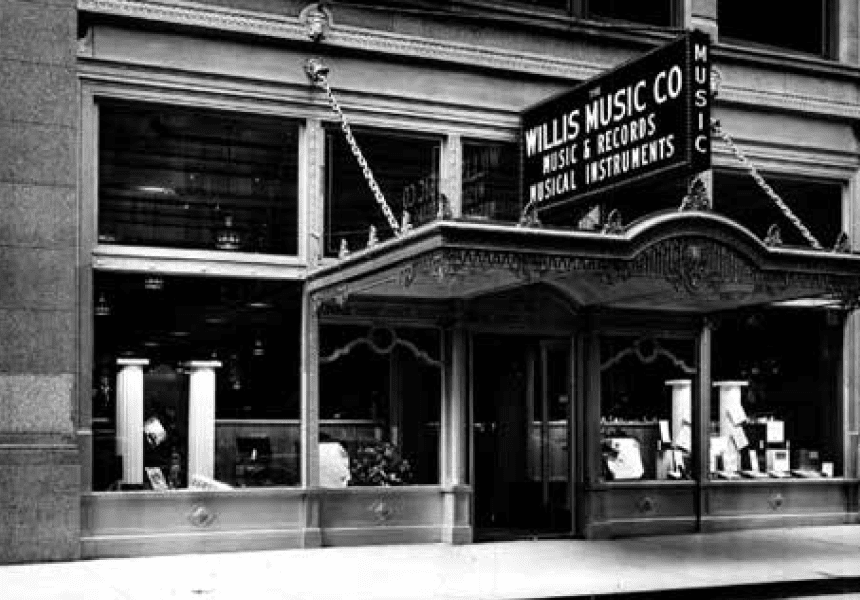 On April 1 of this year, one of our industry’s oldest and most respected retailers turned 120 years old. Since 1899, Willis Music Company has remained family owned and operated and, since the mid-‘50s, has been under the stewardship of the Cranley family. First was John, then his son Edward, and, since 1990, Edward’s son Kevin.
On April 1 of this year, one of our industry’s oldest and most respected retailers turned 120 years old. Since 1899, Willis Music Company has remained family owned and operated and, since the mid-‘50s, has been under the stewardship of the Cranley family. First was John, then his son Edward, and, since 1990, Edward’s son Kevin.
Kevin Cranley recently sat down with MMR to discuss the company’s journey, his own time in the business, and Willis Music’s unwavering commitment to excellence in music publishing and MI retail.
The history of Willis Music is generally known to many in the industry and is detailed quite nicely on the company’s website (www.willismusic.com), but are there any anecdotes from the early years that you’d like to add to the picture?
Yes, this is an interesting item. Part of the deal with Mr. Willis in 1919 was a longterm payout in the form of bonds. In 1943, on August 16 he wrote a letter in the form of a signed affidavit explaining his career. I can only assume my grandfather asked him to do this. But two interesting things arise. First, he implies that he started the business before 1899, but provides no clear date. We have always celebrated 1899 and we always will. Secondly, he describes being a trustee and incorporator of the Music Dealers Association and he took an active part in their conventions. I spoke to Dan Del Fiorentino at NAMM and he didn’t have any idea what he was talking about. Unsolved mystery.
Let’s talk about your father’s time at Willis Music. From what I’ve read, he had seemed more on the path to becoming a ball player than an MI retailer – is that correct? What was his first exposure to the musical instrument business and how did he become involved with Willis Music, ultimately becoming president?
You are correct. He was a baseball player, but at 18 he joined the Navy during WWII. When he returned he tried out for the Red Sox and realized that there were plenty of guys with great fastballs and younger than him. So he went back to school to study history at BC [Boston College – Ed.] and worked at Boston Music, which was also owned by Gus Schirmer, like Willis. After going back to the Navy during the Korean conflict he came back to Boston Music and, when my grandfather completed the purchase of Willis, my dad moved with my mother and three older sisters to Cincinnati. My younger sister and I were born in Cincinnati. It had to be difficult, especially for my mother, to leave her home and parents with three young children and move to Ohio.
I can imagine. Now, to your own time at Willis Music – can you talk about your early memories of the company and your first experiences working for your father?
My first job was painting the floor of our warehouse in Florence, Kentucky, which was new in 1970. I worked Saturdays and summers until I helped build a store close to my house during high school. From then on, during summers I worked at the warehouse and during the school year I worked at the store. I continued working both retail and in publishing until I graduated from College. I went to Xavier University, which was close to home. Shortly after graduating I worked full time in the retail part of the business. Working for my father was difficult. We were both hardheaded and fought a lot. Blame can certainly go both ways. But later in life as he mellowed and I matured we had a wonderful relationship. I couldn’t ask for anything more than all my father did for me.
When you went off to college at Xavier, was it always your intention to return to Willis?
I got ahead of myself. Since Xavier was in Cincinnati, I lived at home and continued working at Willis throughout.
Can you talk about the evolution of your role at the company, post-college, leading to your becoming president in 1990?
We built a great team and expanded rapidly. With a great team in place, I moved my focus to publishing and became president shortly after. At that point, of course, I was focused on both divisions and we were expanding in both areas. Most of the growth in publishing was international and we were able to develop great partnerships around the world. Our direct sales in publishing were North America and the rest of the world, with few exceptions, were handled by what we called sub-publishers.
So in Europe, China, Japan, Australia, and other countries and regions a publisher would translate, print, and distribute our John Thompson, Edna Mae Burnam, and William Gillock books and pay us a royalty. Now with our relationship with Hal Leonard and others, I manage the publishing relationships with about 20 percent of my time and everyone else at Willis, along with 80 percent of my time, is strictly focused on our retail business.
Can you reflect a little on your time as chairman of NAMM and your continued involvement?
Being chairman of NAMM was one of the highest honors of my career. NAMM is a tremendous organization with a staff that is second to none. I wish everyone in our industry could have a close-up view of everything NAMM does for the good of the industry and music makers worldwide. Although I’m a past chairman, along with others who have become great friends, NAMM continues to keep us involved. It is a unique role and I feel we are all ready and willing to help advance the vision and mission of NAMM whenever it’s needed.
Currently, who are the principal senior management folks at Willis Music?
My senior management team at Willis is something I am tremendously proud of. Although he’s retired, I have to mention Dan Herbert who I worked side by side with for over 35 years. Dan is a great friend and helped move Willis to where we are today. Currently our team is: Paul Finke, VP of retail operations (34 years); Myra Barrowman, CFO (22 years); Cindy Hicks, rental division manager (37 years); William Phipps, marketing manager/buyer (25 years); Colleen (Cranley) Merman, education coordinator (9 years); William DiGrezio, advisor (9 years). This latter one is a unique situation – Bill is a volunteer with SCORE. We called on them in 2010 to help us with marketing. Bill has been with us ever since. Bill was in senior management with Sears, LensCrafters, and The Gap before retiring. He is a part of the team in every way and he advised our team and some of us individually.
What are some recent developments of note at Willis Music that our readers might not be aware of?
About eight years ago, we determined a great need to diversify on the retail side of the business. We were very heavy in combo and, as everyone knows, competition was coming from all directions. So we wanted to definitely stay in that business, but knew we needed to expand in other areas to keep the business secure. We expanded in three of our stores with pianos. We now represent Steinway and Sons, Yamaha, and Roland. The other key area for expansion was band and orchestra. We purchased a competitor a few years ago, which grew the business considerably and we have been reinvesting there ever since. Both were difficult transitions, but by finding the best people we feel confident of continued growth. We’ve recently remodeled three of our five stores and are working on another renewal and remodel now.
To mark this year’s anniversary, do you have any special events, sales, or initiatives in the works?
120 is a year-long celebration, but the main event was around our anniversary date in April. Through the help of our vendors we had a celebration on April 6 at all our locations. Vendors pitched in to make it a great event and our customers had a great time with food, live music, and plenty of prizes. The following day we closed our store early and held an employee event which was a great time. We had awards, lots of food and drink, and performances from our staff.




























